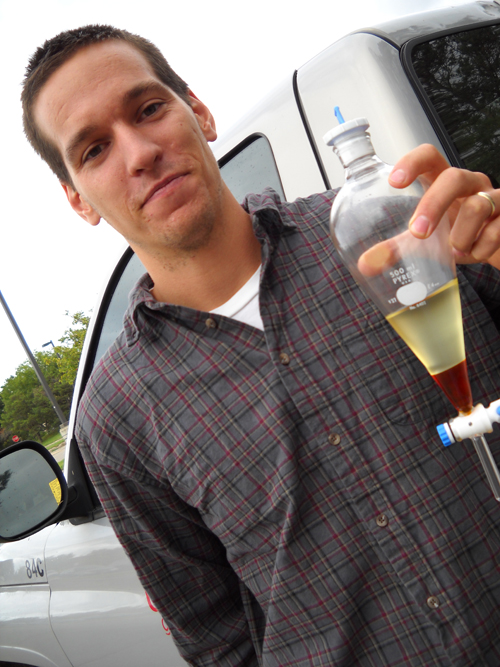
Anton Lamers has his eye on a diesel truck after graduation, and he knows just where he’ll go to gas up: his back yard. Thanks to his master’s studies in environmental engineering, the Guelph student has learned plenty about concocting his own biodiesel from non-food grade oils.
For now, the truck will have to wait. Lamers is preparing to defend his thesis late this fall on a project using micro-organisms to clean up wastewater from biodiesel production. He hopes his studies ─ divided between Guelph and U of G’s Ridgetown Campus ─ will help make a form of renewable energy even greener.
Like wind or solar energy, biodiesel is a renewable energy alternative to regular diesel fuel. Instead of relying on fossil fuels, biodiesel uses oils such as vegetable oil wastes, deep-fryer wastes or even such seemingly exotic products as coconut or palm oil.
“Renewable energy is important. You’re getting away from fossil fuels and being able to live with your environment,” says Lamers.
But even making biodiesel can generate wastes containing organic compounds harmful to the environment. “I’m hoping to remediate that to reduce the impact.”
At first Lamers thought algae might be best for eating up those organics in wash water. But his tests showed fungi were more voracious organic-eaters.
Species of yeast grew better in his dilute wash-water samples than in controls and used up about half of the organic compounds in the liquid. Lamers thinks that certain wastewater components inhibited algae from growing. But fungi apparently found plenty of carbon to gorge on in his samples. “Yeast was invading my algae colonies. We switched gears: we’ve tried algae, let’s try yeast.” He adds that researchers could look further at larger-scale cultures or varying setups to increase yields and remediation.
Lamers says scientists have long known about possible uses of algae and fungi for municipal wastewater treatment, but few researchers have looked at harnessing them to clean up biodiesel wash water. That process might benefit not just the environment but farmers.
Farmers could make money by growing and selling oil crops like soybean for fuel use. After a processing plant makes biofuel, it could return soybean solids to farmers for high-quality livestock feed. Cleaning up wastewater would help the environment, and biomass created in the process could become feedstock for the biodiesel plant, he says.
Engineering professor David Lubitz, who co-supervised Lamers, adds: “We’re trying to make life better for farmers.” Pointing to farmers’ vulnerability to crop prices and input costs, he says, “We want farmers to be able to add value to what they’re producing and reduce their exposure to these outside commodities.”
As a biological engineering undergrad, Lamers completed an energy conservation project for a class with Lubitz that piqued the student’s interest in renewables. For his master’s research, he worked with Everpure Biodiesel Co-op based in Erin, Ont., and collected his samples from a biodiesel demonstration plant opened last year at U of G’s Ridgetown Campus. The plant belongs to Ridgetown’s Centre for Agricultural Renewable Energy and Sustainability. Organizers, including Lamers’s co-supervisor Prof. Rob Nicol, School of Environmental Sciences, hope to make up to 80,000 litres of biodiesel a year and persuade farmers to investigate the process for income.
Federal regulations will require biofuels to contain two per cent biodiesel by 2012, says Lamers. “We need to expand the supply four or five times to meet that requirement.”
He adds: “When you run biodiesel, you’re cleaning your engine, and your emissions are much lower.”
After defending his thesis, Lamers plans to help his dad develop a three-megawatt solar farm at home in Caledon, Ont., and begin making his own biodiesel for that hoped-for truck.